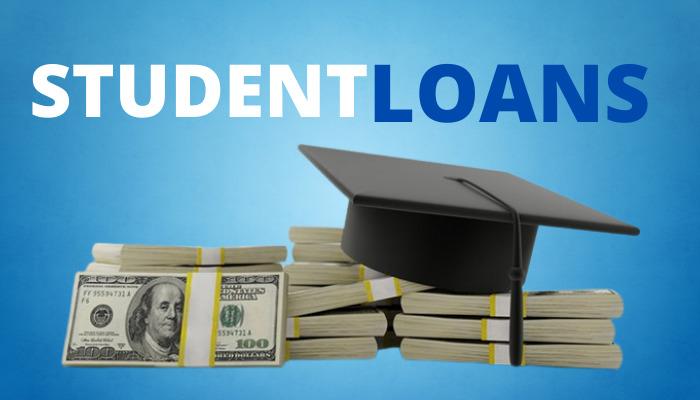Last Updated on July 1, 2024 by admin
Are you interested to know how the student loans work and seven (7) important things you need to know before you can apply for the student loans, here are the points you’re interested with? if you need money for college, you don’t have access to consider any other loans except the student loans, and before you can apply for student loan, you need to know how do they work.
You may be able to borrow money to help pay for university or college tuition fees and help with the living costs and start repaying once you earn certain amount and interest on the loan which depend on how much you earn not what you owe.
In this article ,we are going to discuss how to get student loan, eligibility and process to apply for student loan in United States , United Kingdom and Canada
federal student loans, usually have more benefits than loans from banks or other private sources. Learn more about the differences between federal and private student loans.
What is student loan
A student loan is a type of loan designed for students, you can apply for student loans from federal government or from the private lenders, which help students for the cost of their college fees. or living expenses. Note, it will favor you if you can apply for student loans from federal government because is better than private lenders, however, federal student loans have lower interest than the private lenders and it have flexible repayment than the other loans.
Student loans in United Kingdom
There are different kind of loan available to uk student which include the following.
1. Tuition fees loan: This help student cover the full cost of your course and paid directly to the course provider. the good aspect is that you wouldn’t have to pay it back until after your course when you’re earning above a certain level
2. Maintenance loan:it help you get money at start of each term or monthly in Scotland
3. student grant: this available to eligible for certain benefit ,disable or need help with childcare costs.
How to get undergraduate finance in United Kingdom
- check if your are eligible
- Find out how much loan you could get
- check if you can get extra help
- prepare your application
- Apply online which can take up to 6 weeks to process your application, you might have to provide extra evidence
- Update your details if circumstance change
- make sure you can be paid
- check what to do while you’re studying
- Repay your loan
Eligibility to apply for UK student loan
1. You must a university student or college
2. Your nationality or residency status
3.Your age
4. If your course in uk fall among the following
.First degree .BA,BSC, BEd, certificate of higher education, Diploma of higher education,Higher national education,Higher national diploma,pre-registration post graduate healthcare course and an integrated master degree and other course.
Canada Student Grants and Loans
The Canada Student Financial Assistance Program offers student grants and loans to full-time and part-time students. Grants and loans help students pay for their post-secondary education.
List of federal student grants
Your eligibility for all Canada Student Grants is assessed when you apply with your province or territory:
1. Grant for full-time students
2. Grant for part-time students
3. Grant for full-time students with dependants
4. Grant for part-time students with dependants
5. Grant for students with permanent disabilities
6. Services and equipment for students with permanent disabilities
Other student aid IN CANADA include:
1. Apprentice loans and grants
2. Scholarships
3. Indigenous learning
4. Aid for reservists
5. Aid for protected persons
6. Aid for athletes
Eligibility For Canada Student Loans
1. To qualify for student loan, you Must be a Canadian citizen, a permanent resident of Canada or designated as a protected person; Must be a permanent resident of a province or territory that issues Canada Student Loans (Note: The Northwest Territories, Nunavut and Quebec operate their own student loan programs.
2. Your eligibility depends on your Expected Family Contribution, your year in school, your enrollment status, and the cost of attendance at the school you will be attending.
3. Must be enrolled in 20-59 percent of a full course load if you are a part-time student (if you are a student with permanent disabilities and you are studying between 40-59 percent of a full
4. Must not have exhausted your maximum lifetime limit for financial assistance (including interest-free status).
5. Must be enrolled in a degree, diploma or certificate program offered by a designated post-secondary school that runs for at least 12 weeks within a 15-week period
6. Must pass a credit check if you are over the age of 22 and are applying for your first Canada Student Loan.
How to apply for student loan in Canada
You can Apply Canada Student Grants and Loans from your province or territory after finding our your eligible for student grants and loans as list below.
1. Provincial and territorial student aid offices
2. Alberta Student Aid
3. British Columbia Student Aid
4. Manitoba Student Aid
5. New Brunswick Student Financial Services
6. Newfoundland and Labrador Student Aid
7. Northwest Territories Student Financial Assistance
8. Nova Scotia Student Assistance
9. Nunavut Student Funding
10. Ontario Student Assistance Program (OSAP)
11. Prince Edward Island Student Financial Services
12. Quebec Student Financial Aid
13. Saskatchewan Student Loans
14. Yukon Student Financial Assistance
Type of student loans are available in United states
We have two main types of lenders that offer the student loan. They are Federal student loan offer by Government and Private lender offer by online , banks and credit union
Federal student loan
The U.S. Department of Education’s federal student loan program is the William D. Ford Federal Direct Loan (Direct Loan) Program. Under this program, the U.S. Department of Education is your lender. There are four types of Direct Loans available:
Federal student loans are types of loan that created by US government. It is a good option for you to choose federal loans when you want to apply for student loans, because these types of loans are less cost than the private loans and it have low interest and more benefits than the loans you apply from private lenders.
This kind of loan doesn’t require a credit check for undergraduates and it offer multiple protections for borrowers in repayment.
Federal loan options include Direct Subsidized and Direct Unsubsidized Loans which are available to undergraduate students with demonstrated financial need
Direct Subsidized Loans
For federal Direct subsidized loans, the government pays the interest on subsidized loans while enrolled in college at least half-time and for six months after you graduate or drop below half-time enrollment.
Direct Unsubsidized Loans
Annual limits for direct unsubsidized loans range from $5,500 for first-year undergraduates to $20,500 for graduate and professional students.Unlike subsidized loans, you will need to pay the interest that has accrued on your loan while you are in college. There are annual and lifetime limits for Direct Subsidized and Unsubsidized loans, however, so students might not be able to cover the full cost of college with these federal loan options.
Direct PLUS Loans
This kind of loans are made to graduate or professional students and parents of dependent undergraduate students to help pay for education expenses not covered by other financial aid, but a credit check is required. Borrowers who have an adverse credit history must meet additional requirements to qualify.
Direct Consolidation Loans
The federal student loans allow borrower to combine all of their eligible into a single loan with a single loan services.
Private student loans
Private student loans are types of loan that come from private lenders, these private loans are usually be a bank, a credit union or non-financial institution. These private loans have higher interest rate and non-flexible benefits like the federal student loans, even they require for the cosigner before they can approve you. Once you applied for the private student loans, the loan will be started rising the interest
Unlike federal student loans, private student loans typically require applicants to pass a credit and income review to verify that they will be able to repay the loan.It’s advice-able to apply for a private student loan once you have exhausted your federal student loan options
Types of private student lenders
There’s a variety of private student lenders, including:
. Banks,credit unions, state loan lenders such as Navy Federal Credit Union,Citizens Bank etc.
. Online lenders, such as CommonBond and Earnest, College Ave Student Loans,ascent,Sofi etc
How to Apply For Student Loans
If you apply for financial aid, you may be offered loans as part of your school’s financial aid offer. A loan is money you borrow and must pay back with interest.
Federal student loan process
To apply for a federal student loan, you must first complete and submit a Free Application for Federal Student Aid (FAFSA®) form. Based on the results of your FAFSA form, your college or career school will send you a financial aid offer, which may include federal student loans. Your school will tell you how to accept all or a part of the loan.
2. complete entrance counseling, a tool to ensure you understand your obligation to repay the loan; and
3. sign a Master Promissory Note, agreeing to the terms of the loan.
For more details,please Contact the financial aid office at the school you are planning to attend for details regarding the process at your school
Private student loan process
To apply for a private loan you don’t need to file a FAFSA. You’ll need to apply for a loan with an individual lender. The lender will check your credit score and will often require a creditworthy cosigner.
List of Best Private Student Loans for College
1. Sallie Mae : They have loan tenor of 10 years to 15 years with fixed APR of 3.50% – 12.60% and Variable APR of 1.13% – 11.23%
2. Ascent Student Loans: Student loan tenor of 5 years, 8 years, 10 years, 15 years
3. College Ave
4. Earnest
5. SoFi
Why should you take out federal student loans
Federal student loans are an investment in your future. You should not be afraid to take out federal student loans, but you should be smart about it.
1. They offer flexible repayment plans and options to postpone your loan payments if you’re having trouble making payments.
2. You don’t have to begin repaying your federal student loans until after you leave college or drop below half-time.
3. You don’t need a credit check or a cosigner to get most federal student loans.
4. The interest rate on federal student loans is fixed and usually lower than that on private loans—and much lower than that on a credit card.
Seven (7) important things you need to know before apply for student loan
Before apply for student loan try and check if you can qualify for scholarships, make use of work-study and grant aid, and check in with your employer about tuition reimbursement if you’ll work while in school. Student loans should be one of the final options to consider when planning how to pay for college.
1. You need to determine how much you owe, and you will check how much will you paid for the remaining years in college.
2. Check and find out your student loan and how much the loan compounds.
3. You must think on how much you need before you can apply for the loan because of the repay of the loan
4. You need to add any origination fees.
5. You must calculate the total amount of debt you owe after graduate from college.
6. Try to understand the lenders with the payment because once you apply for the loan your school will handle the rest.
7. Find out who the servicer is and when you will start the payment.
How do student loans work?
Loan payments are applied to the loan balance in particular order. The payment you owe will applied to the payment fees and the collection charges. furthermore, the payment will be applied to the payment that rise in the last due payment and any remaining money will applied to the principal balance. Your progress will make it quick to pay down the debt.
How much you pay in interest depends on a number of factors: whether your loan is subsidized or unsubsidized, the interest rate on your loan, the amount you borrow, and the loan term.
They’re not just forcing you to pay back the amount of money you borrow, they will implore you to pay the interest, the total amount you pay in interest depends on a number of factors, the interest on the loan you borrow also the loan term.
Generally, loan continues to rise when during forbearance and non-payment of borrowers, which means if you lose or skip to cover up the money you borrow, the total cost of your money will rise and which is because of skip of payment.
- List of 9mobile/etisalat data Plan and subscription code - January 27, 2026
- How to buy data, Request and gift dataon Airtel - January 26, 2026
- How to buy Glo data plan and cancel data Renewal - January 24, 2026










